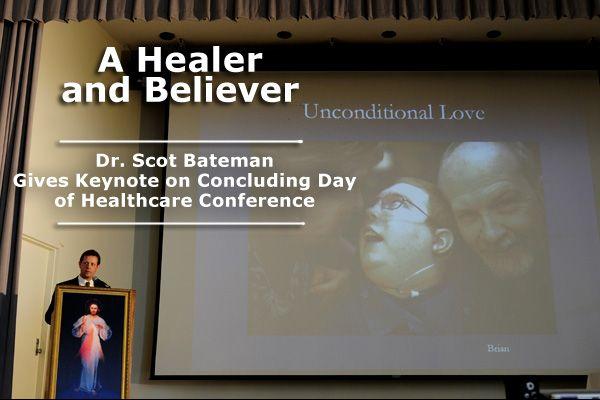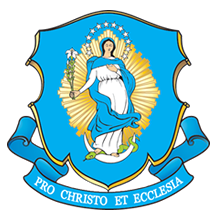May
02
2008
By Anonymous (not verified)

Suffering and hope were the related opposites that drew Scot Bateman to his career as a pediatric doctor and to the Catholic Church.
Dr. Bateman, division chief of pediatric critical care at the University of Massachusetts Medical Center and associate professor of clinical pediatrics at UMass Medical School, gave the keynote address for the final day of the 4th Annual Healthcare Professionals for Divine Mercy Conference, sponsored by the Marians of the Immaculate Conception. The conference, on April 29-30 at the College of the Holy Cross, Worcester, Mass., was geared toward training healthcare professionals on how to spiritually care for patients.
Breaking from the clinical mode of his presentation at last year's conference, Dr. Bateman lifted the skin and got underneath his motivations to become a healer and a believer. They are related, he said, for they both reside within the answer - the response, at any rate - of perhaps the most haunting question that shadows us through life: Why do the innocent suffer?
Helplessly, Hopelessly
Dr. Bateman said pediatric intensive care, which treats gravely ill children, is a guaranteed ticket to the most intense suffering imaginable - that of a child who cannot understand pain while experiencing it fully and that of the family that must watch, helplessly and often hopelessly.
"Why was I drawn to pediatric ICU?" Dr. Bateman asked. "I'm not able to explain why I chose this. I had the feeling that it was right." That feeling prevailed over the opinion of Scot's physician father, who tried to discourage his son from medicine. He also had to hear the concerns of those in the business, who knew what he would be up against. He tried to talk himself out of his medical specialty, but he couldn't. Instead, he followed his inner compass, leading him true.
"I knew I would be racked with a lot of difficulties [as an ICU pediatrician]," Dr. Bateman said. The statistics, grim as they are, can only present a distant and antiseptic look at the human reality they describe. Under each number lives momentous suffering. Each year in the United States there are more than 55,000 pediatric deaths, or almost 154 a day. Half of these deaths occur in the first year of life, with more than two-thirds occurring when life-sustaining treatments are stopped.
Questions without Answers
"I was faced with questions that didn't have answers," Dr. Bateman, 41, admitted. "Without a spiritual basis, [my job] became harder and harder." He was not without God, though. "I felt a presence larger than me, but I wasn't acknowledging it." Nonetheless, he began to pay more attention to the inner voice that began to nag him. He began to read and reflect about God, when he realized, "My God had been with me all along."
He also had been deeply affected by his early experiences as a doctor. The first patient he ever treated as a young medical student died in front of him. After the body had been cleaned and removed, he said he went into the bathroom and cried uncontrollably. Another patient, an 11-year-old girl, died of cancer. "I marveled at the depths of my sorrow, that the best I could offer of modern medicine had failed." Just before she died, the girl asked him a question that rocked him. She asked, "What's it like to die?"
These cases, and others like it, "exposed a lack of spirituality," Dr. Bateman said. "I didn't have a context in which to place suffering and death."
That began to change after he discovered Catholicism and began to seriously explore his spiritual yearnings. Scott said Catholicism drew him by its doctrine of suffering and because the word "catholic" means "universal." Certainly, he knew, patients, families, and healthcare providers want the same thing - healing - and experience the same thing when a cure can't be found - sorrow and suffering.
God Steps In
An intervention of sorts occurred on Pentecost Sunday in 2002 while Dr. Bateman attended a medical conference in Atlanta, Ga. Walking by a Catholic Church, he was drawn to a stained glass window depicting the Sacred Heart of Jesus. The image affected him deeply. He went inside the church and sat in the last pew for Mass. Not knowing any better at the time, he received the consecrated gifts, both species, despite the fact that he hadn't yet become a Catholic.
After receiving the Body and Blood, he felt a pleasant warmth emanating throughout his body. It grew until it spilled beyond him to include the others in the church, the pews, the bricks and mortar of the church, everything. After this, he said he cried for a half an hour, until he "went from crying to laughing." He said, "A sense of peace entered my vocabulary for the first time."
Scot was baptized a Catholic during the Easter Vigil 2004 at St. Ignatius chapel on the campus of Boston College. Since then, he has turned the focus of his practice around from taking to giving. Soon after, another major piece of the spiritual puzzle fell into place when he tracked down his future wife, Ann Salerno, who had moved to Philadelphia. Ann, a Catholic and also a pediatric physician, became not only Scot's spouse but also his spiritual confidante.
Time to Give Back
"It had come time for me to give back," he said. "Up to then, all I had done was take, take, take." He took from his patients, he explained, who unknowingly had given him so much and helped form him, spiritually. As part of his giving back, he and his wife made a trip with their parish to provide medical care to children living in the poorest part of Kingston, Jamaica. He and his wife are also active in the Worcester Guild of the Catholic Medical Association, a Christian fellowship for doctors in the Worcester area, providing opportunities to share with like-minded colleagues how to become a better doctor and a better Catholic. He has also made a directed effort to bring a faith-based approach to his staff at the Pediatric Critical Care Department at the UMass Medical Center.
He ended with a question: "Does it get any easier? It doesn't." But, he added, having added a spiritual basis to underlie his best efforts as a physician has made a difference for the better. His faith, he said, has helped remove barriers that interfered with his ability to understand the full dynamics of his difficult job. That, in the end, has made him not only a better person, but a better doctor.
Other speakers on the conference's final day included:
Dr. Bryan Thatcher, MD, who shared personal anecdotes of how faith has informed his work in internal medicine. Dr. Thatcher is the international director of Doctors for Divine Mercy and founder of Eucharistic Apostles of The Divine Mercy, which, like Healthcare Professionals for Divine Mercy, is an apostolate of the Marians of the Immaculate Conception.
Fr. Seraphim Michalenko, MIC, director of the Association of Marian Helpers, whose talk was titled "The Divine Mercy Message and Devotion: Apostolic Message for Healthcare."
Maureen and Bob Digan, who talk was titled "Sharing the First Miracle." Maureen was the recipient of the first Church-certified miracle, which led the way to St. Faustina's beatification.
Fr. Kazimierz Chwalek, MIC, director of Evangelization and Development for the Marians, who spoke on "The Message of Mercy and Culture."
Marie Romagnano, RN, who, with Fr. Kazimierz, gave a talk titled, "Case Study: Medical and Spiritual Considerations of the Cancer Patient." Marie is founder and director of Healthcare Professionals for Divine Mercy.
A closing Mass was celebrated in St. Joseph Chapel on the Holy Cross Campus.
Dan Valenti writes for numerous publications of the Marians of the Immaculate Conception, both in print and online. He is the author of "Dan Valenti's Journal" on thedivinemercy.org.
nTHJ
















